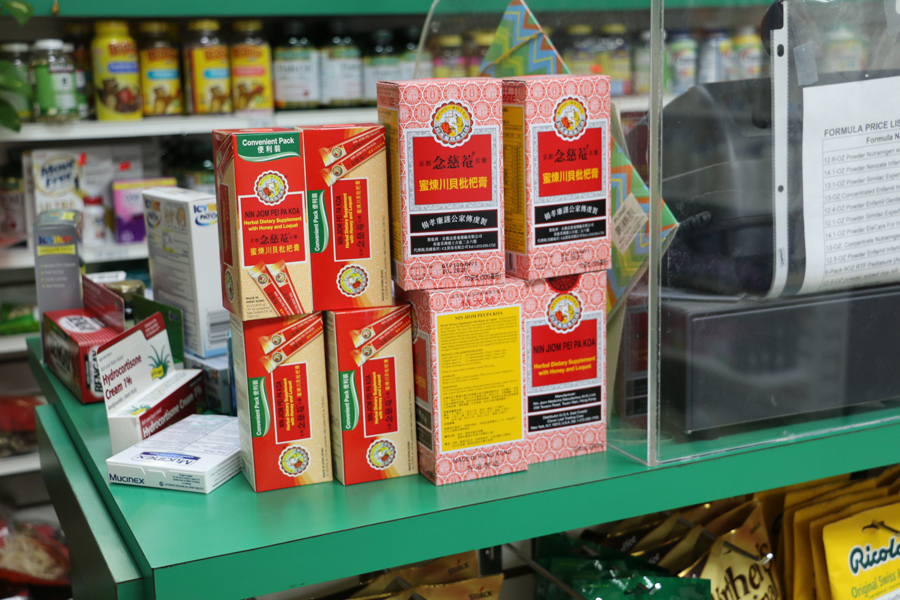Heng Kang Pharmacy in Chinatown, New York, displays Nin Jiom Pei Pa Koa cough syrup on its counter as the remedy has become popular locally, on Feb 26. ZHANG RUINAN/ CHINA DAILY
Nin Jiom Pei Pa Koa cough syrup has gained popularity among New Yorkers as the US is facing its worst flu outbreak in nearly a decade. "
"I'd been super sick for a week and a half and couldn't stop coughing," Alex Schweder, an architect and professor of design at Pratt Institute who used the syrup told The Wall Street Journal.
Schweder said it started working in 15 minutes, and he has recommended it to five people and told many more about it.
The remedy, an "herbal dietary supplement with honey and loquat", according to' its label, is often referred to as Pei Pa Koa and is sold both in cough-drop form and more commonly in 10-ounce bottles in Chinese markets and Chinese pharmacies.
"Many American customers have been asking about it recently," said a saleswoman at Heng Kang Pharmacy in New York, which sells the syrup. "In the past, most people who came to shop were Chinese or Chinese Americans."
The owner of the pharmacy "has moved the product to its'counter. "Many customers have been suffering from the bad flu this year, and they are recommended by friends to try the Pei Pa Koa for the cough-ing," the saleswoman said.
According to The New York Times, this year's flu season in the US is now more intense than any since the 2009 swine flu pandemic, which killed 148 children and an estimated 56,000 adults, mostly elderly.
And it's still getting worse, federal health officials said last month.
As of the week ending Feb. 17, a total of 97 influenza-associated pediatric deaths had been reported for the 2017-18 flu season, according to the Centers for Disease Control and Prevention.
Heng Kang Pharmacy sells a 300-milliliter bottle of Pei Pa Koa for about $7. The price of the same product retails on Amazon for about $14.
"This product is amazing!" wrote April Roe, a customer who brought the syrup on Amazon in January. "I had the flu cold that's going around, had a seriously raw throat and heavy mucus; took this before going to bed and my throat quit being painful while coughing.
"Over the next two days the heavy mucus was gone, no sore throat, just a minor cold."
And some patients desperate to get their hands on it have been paying as much as $70 to third parties, according to The Wall Street Journal.
According to the South China Morning Post, the syrup dates back to the Qing Dynasty (1644-1912), during which an official sought a medicine to cure his mother's chronic cough. "Nin jiom" means "in remembrance of my mother."
Taking herbal supplements can be risky, including when they are used with medicines, consumed in excess or taken instead of prescription medication, according to experts.
"It's (Pei Pa Koa) suitable for someone having wind and heat attacks or chronic Yin deficiency cases, according to Chinese medicine theory. If someone has a wind-cold attack, the syrup is probably not appropriate," said Dr. Yemeng Chen, president of the New York College of Traditional Chinese Medicine. "And diabetes patients are not advised to take it due to the amount of sugar it contains.
"Prepared Chinese herbal products should be used under a practitioner's guidance. Because of different individual body constitutions and symptom development, herbs work for some but may not work for the others, or could even be harmful," Chen added. "So, it is important to consult with the practitioners."
Chen said traditional Chinese medicine is becoming more popular in the US.
"The trend of students who wish to learn Chinese herbs is increasing, especially after November 2016, when the herbs were legally applied within the practice scope of acupuncture after legislative status changes in New York state," said Chen.
Following The Wall Street Journal's story last week, shares of the company that produces it, Hong Kong-listed pharmaceutical distributor Kingworld Medicines Group Ltd, were up 33.6 percent in afternoon trading in Hong Kong on Monday.

















